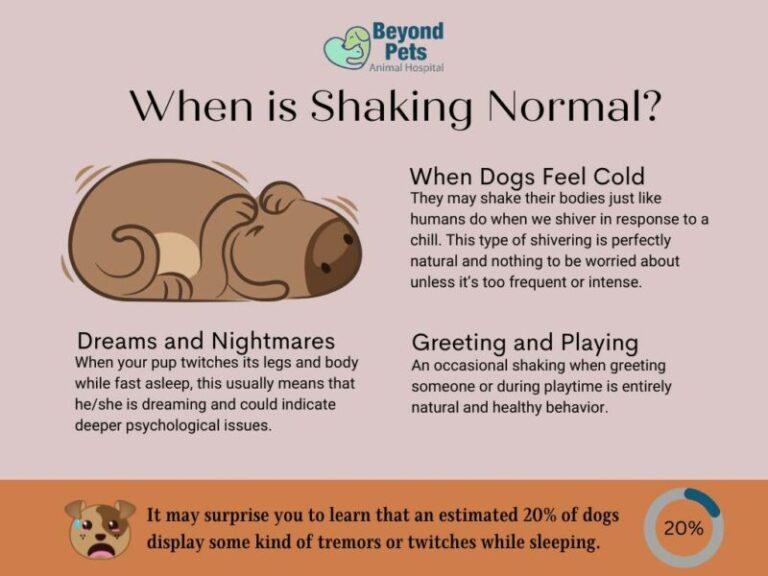If your dog is shaking and acting weird at night, it may indicate a severe medical condition or an emergency situation that requires immediate veterinary attention. Possible causes of these symptoms include severe pain, toxin exposure, seizures, low blood sugar, neurological disorders, or extreme fear and anxiety.
It is essential to monitor your dog’s behavior closely and seek professional medical advice to address the underlying issue causing these symptoms. If you notice that your dog is shaking and acting strangely during the night, it can be quite concerning.
While occasional shaking in dogs is normal, persistent shaking accompanied by unusual behavior can indicate a more serious problem. It is essential to understand the potential causes of these symptoms and take appropriate action to ensure your dog’s well-being. We will discuss the possible reasons behind your dog’s shaking and weird behavior at night and provide some guidance on what to do in such situations. By being proactive and seeking proper veterinary attention, you can help identify and address any underlying health issues your dog may be experiencing.
:strip_icc()/shaking-in-dogs-4177790_FINAL-resized-ec131de3ebac484c89f552451feab57e.png)
Credit: www.thesprucepets.com
Causes Of Shaking And Acting Weird In Dogs
When your dog starts shaking and acting weird at night, it can be a cause for concern. Uncontrollable shaking in dogs can indicate a severe medical condition or an emergency requiring immediate veterinary attention. Let’s take a closer look at some potential causes that may be behind your dog’s unusual behavior:
Pain
Pain is one of the most common reasons for dogs to shake and act strangely. They may be experiencing discomfort due to an injury, arthritis, or other underlying health issues. It’s important to keep an eye out for any signs of pain such as whimpering, limping, or sensitivity to touch. If you suspect your dog is in pain, it’s crucial to seek veterinary care to determine the cause and provide appropriate treatment.
Toxin Exposure
A dog that has ingested a toxic substance may exhibit shaking and abnormal behavior. Common toxins include certain foods, plants, medications, or household chemicals. If you suspect your dog has been exposed to a toxin, contact your veterinarian immediately for guidance on how to handle the situation.
Seizures
Seizures can cause extreme shaking and disorientation in dogs. Epilepsy, brain tumors, and other neurological disorders can increase the likelihood of seizures. If your dog experiences seizures, it’s crucial to consult a veterinarian to determine the cause and create a management plan.
Hypoglycemia
Low blood sugar, known as hypoglycemia, can cause your dog to shake and exhibit unusual behavior. This condition is particularly common in small dog breeds and can be caused by a variety of factors, including poor nutrition, diabetes, or hormonal imbalances. A veterinarian can diagnose and recommend appropriate treatment for hypoglycemia.
Neurological Disorders
Various neurological disorders, such as shaker syndrome, can cause dogs to shake uncontrollably. These disorders often have genetic or inherited components and can result in tremors and muscle weakness. If you notice consistent shaking or muscle abnormalities, consult your veterinarian for a proper diagnosis and treatment plan.
Fear And Anxiety
Dogs can shake and act weird when they are experiencing fear or anxiety. Loud noises, unfamiliar environments, or traumatic experiences can trigger such reactions. If your dog’s shaking and strange behavior seem to be rooted in fear or anxiety, it’s important to provide a calm and safe environment. Consult your veterinarian for guidance on behavior modification techniques or potential medication options to alleviate your dog’s anxiety.
Diagnostic And Treatment Options
If your dog is shaking and acting weird at night, it could be a sign of a severe medical condition or an emergency. Possible causes include pain, toxin exposure, seizures, low blood sugar, neurological disorders, or extreme fear or anxiety.
It’s important to seek immediate veterinary attention to determine the underlying cause and provide appropriate treatment.
When To See A Vet
If your dog is shaking and acting weird at night, it’s important to know when to seek veterinary care. While occasional shaking can be normal, persistent or severe shaking may indicate an underlying medical condition that requires attention. Here are some signs that warrant a visit to the vet:1. Prolonged or Unexplained Shaking: If your dog’s shaking lasts for an extended period of time or there is no apparent cause, it’s essential to have them evaluated by a veterinarian.2. Changes in Behavior: If your dog is acting unusually, such as being overly anxious or lethargic, it’s important to have them assessed by a professional.3. Physical Symptoms: If shaking is accompanied by other symptoms like vomiting, loss of appetite, or difficulty breathing, it may indicate a more serious condition that requires immediate attention.Shaker Syndrome In Dogs
One potential cause of shaking in dogs is shaker syndrome, a condition that typically develops in early adulthood. Dogs with shaker syndrome experience involuntary and repetitive muscle movements that resemble shaking. These tremors can affect localized areas of the body, such as the head, or involve the entire body. Shaker syndrome can be a neurological disorder and is often treated with medication prescribed by a veterinarian.Underlying Medical Conditions
There are various underlying medical conditions that can cause dogs to shake and act weird at night. Some common conditions include:1. Pain: Dogs experiencing severe pain may shake as a response. It’s essential to identify the source of the pain and provide appropriate treatment.2. Toxin Exposure: If your dog has ingested a toxic substance, shaking can be a symptom. Immediate veterinary care is necessary in such cases.3. Seizures: Seizures can cause dogs to shake uncontrollably. If your dog experiences a seizure, it’s crucial to seek veterinary attention.4. Hypoglycemia: Low blood sugar levels can lead to shaking and other abnormal behaviors in dogs. Close monitoring and appropriate treatment can help manage this condition.It’s important to note that the above conditions are not an exhaustive list, and other underlying medical issues could be causing your dog’s shaking and strange behavior. Consulting a veterinarian is crucial in order to accurately diagnose and prescribe the appropriate treatment.In conclusion, if your dog is shaking and acting weird at night, it’s essential to first assess the severity and duration of the symptoms. When in doubt, it’s always best to consult with a veterinarian to ensure your furry friend receives the necessary care and treatment.Prevention And Home Care
If your dog is shaking and acting weird at night, it could be a sign of a severe medical condition or an emergency. Possible causes include pain, toxin exposure, seizures, low blood sugar, neurological disorders, or extreme fear or anxiety.
It’s important to seek immediate veterinary attention to ensure proper treatment.
Dealing With Cold
Exposure to cold temperatures can cause dogs to shake and act weird at night. To prevent this, provide your furry friend with adequate shelter and warmth. Ensure your dog has a cozy bed and blankets to keep them warm during the chilly nights.
Managing Stress And Anxiety
Stress and anxiety can also contribute to your dog’s shaking and unusual behavior at night. Creating a safe and calm environment for your pet is crucial in preventing these issues. Consider introducing soothing music or aromatherapy to help relax your furry companion. Positive reinforcement and regular exercise can also alleviate stress and anxiety in dogs.
Seeking Attention
Dogs may exhibit shaking behavior as a way of seeking attention. Ensure your dog receives enough mental and physical stimulation throughout the day to prevent attention-seeking behaviors at night. Regular playtime, training, and interactive toys can keep your dog engaged and fulfilled, reducing the chances of night-time shaking due to attention-seeking.
Old Age-related Tremors
Older dogs may develop tremors as they age. These tremors are often benign and not a cause for immediate concern. However, it is essential to keep an eye on your aging pet’s overall health. Providing a comfortable and supportive environment, regular vet check-ups, and a nutritious diet can help manage age-related tremors.

Credit: www.winston-salem.carolinavet.com

Credit: www.petsbest.com
Frequently Asked Questions Of My Dog Is Shaking And Acting Weird At Night
What Can I Do If My Dog Is Shaking And Acting Weird All Of A Sudden?
If your dog is suddenly shaking and acting weird, it could be a sign of a serious medical condition or an emergency. Some possible causes include severe pain, toxin exposure, seizures, low blood sugar, neurological disorders, or extreme fear or anxiety.
It is important to seek immediate veterinary attention to determine the cause and provide appropriate treatment.
Should I Be Worried If My Dog Is Shaking At Night?
If your dog is shaking at night, it could be a sign of a more serious medical condition and requires immediate veterinary attention. Possible causes include severe pain, toxin exposure, seizures, low blood sugar, neurological disorders, or extreme fear/anxiety. Don’t hesitate to consult a vet for proper diagnosis and treatment.
Do Dogs Shake When In Pain?
Yes, dogs may shake when in pain. Shaking in dogs can indicate discomfort, mental distress, or disease. It’s important to pay attention to your dog’s behavior and seek veterinary attention if the shaking is severe or persistent.
What Is Shaker Syndrome In Dogs?
Shaker syndrome in dogs is a condition characterized by rhythmic, involuntary muscle movements that resemble shaking. It typically develops in early adulthood and can affect a specific area or the entire body. Causes may include severe pain, toxin exposure, seizures, hypoglycemia, or neurological disorders.
Immediate veterinary attention is necessary for this emergency situation.
Conclusion
If you notice that your dog is shaking and acting weird at night, it’s important to pay attention to these signs. Uncontrollable shaking in dogs can be an indication of a serious medical condition or an emergency that requires immediate veterinary attention.
Some potential causes of shaking in dogs include severe pain, toxin exposure, seizures, hypoglycemia, neurological disorders, or extreme fear and anxiety. If you’re concerned about your dog’s well-being, it’s best to consult with a veterinarian for a proper diagnosis and treatment plan.
Remember, your furry friend relies on you to take care of their health and well-being.



